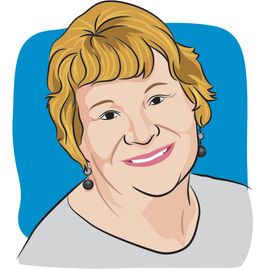- About Us
- Advertise / Support
- Editorial Board
- Contact Us
- CancerNetwork.com
- TargetedOnc.com
- OncLive.com
- OncNursingNews.com
- Terms & Conditions
- Privacy
- Do Not Sell My Information
- Washington My Health My Data
© 2025 MJH Life Sciences™ and CURE - Oncology & Cancer News for Patients & Caregivers. All rights reserved.
I'll Never Get to Ring the Bell

Jane Biehl is a 12-year survivor of a very rare form of blood cancer, known as myelodysplastic syndrome (MDS). She has enjoyed several exciting careers including a librarian, counselor, teacher, and writer. She loves to write about surviving cancer, overcoming hearing loss and the wonderful benefits of having a hearing-ear service dog.
Patients with cancer are often asked when they’ll be done with chemotherapy or treatment. Those of us with blood cancers and bone marrow type of cancers such as aplastic anemia, myelodysplastic syndrome, lymphoma and leukemia, along with a host of other cancers sadly have to say, “never.”
I never knew about the bell until I was diagnosed with cancer. In many cancer centers, including the one where I receive my treatments, women and men who have been diagnosed with breast cancer get to pick up and ring the clapper. After their last chemo treatment, they celebrate as their family and the nurses all form a circle and clap to commemorate this wonderful milestone of their lives. This is a very special ceremony that the survivor looks forward to from the beginning of the horrible chemo and side effects to the final session.
Patients with cancer are often asked when they’ll be done with chemotherapy or treatment. Those of us with blood cancers and bone marrow type of cancers such as aplastic anemia, myelodysplastic syndrome, lymphoma and leukemia, along with a host of other cancers sadly have to say, “never.”
Happily, a great deal of education has been done with breast cancer. Women are taught from an early age how to detect a suspicious lump. Unfortunately, men have not been taught as much, but this is slowly changing as awareness for breast cancer continues to grow.
I was so ignorant about a blood cancer that when my oncologist told me I had MDS and would live an average of nine years, my reaction was, “But you found it early.” I was thinking with any type of cancer, the earlier a cancer is found the better and the chance to recover is more likely. Her reply was, “This isn’t stage 1, 2, 3, 4.”
She never went on to explain anything about this type of cancer. The first thing I did was switch doctors, and the second thing I did was to do research.
Another friend of mine with a blood cancer has confided to me that she shares my feeling of being just a little envious when we hear patients ringing the bell, knowing we never will. There have been times that my doctor has taken me off chemo for several weeks between different types of chemo, or when I take a trip and I feel wonderful. How I wish I could stop chemo and that energy would last forever!
Please do not misunderstand me. Every cancer is awful, and one is not easier than another. I am not getting into a contest here and know each of us has our own trauma story. Many may feel that we have faced death in the face.
But what I would love to see is more education on ALL types of cancer. With more education, a patient like me doesn’t ask a stupid sounding question like, “What stage do I have?” Some of this is already happening due to organizations like CURE, Aplastic Anemia and MDS International Foundation, Gastric Cancer Foundation, National Cancer Institute, American Cancer Society and many others, that provide invaluable information. We find out earlier what the symptoms are of colon cancer, stomach cancer, esophageal cancer, brain cancer and on and on.
I know now that for blood cancer, the alarm signals are often severe anemia and constant infections. It usually takes a sharp diagnostician like my family doctor to look at the blood counts for anemia and do the referral to an oncologist/hematologist.
Support groups are very important, and it is difficult to find enough people with one type of cancer to form one. The breast cancer survivors are way ahead of everyone else and even have their breast cancer survivor’s dragon boating.
However, other types of cancer survivors may not be able to fully take part in this. The founder who started the movement is a Canadian sports medicine specialist who researched the benefits of this sport to breast cancer survivors only.
I think it is time for a change! Why can’t each of us have our own bell? Maybe just celebrating life! Simply surviving one year of successful chemo, or two years or three years? All of us cancer survivors are in this war against a terrible disease together! Every one of us needs a chance to receive support, to become educated and to celebrate and ring the bell!
Related Content:


